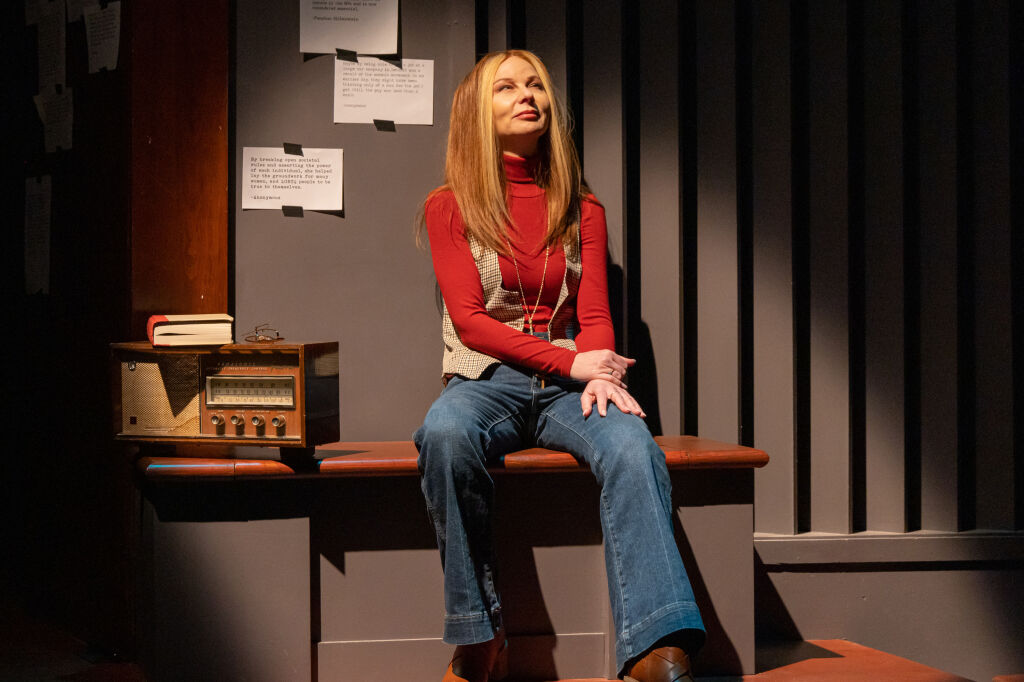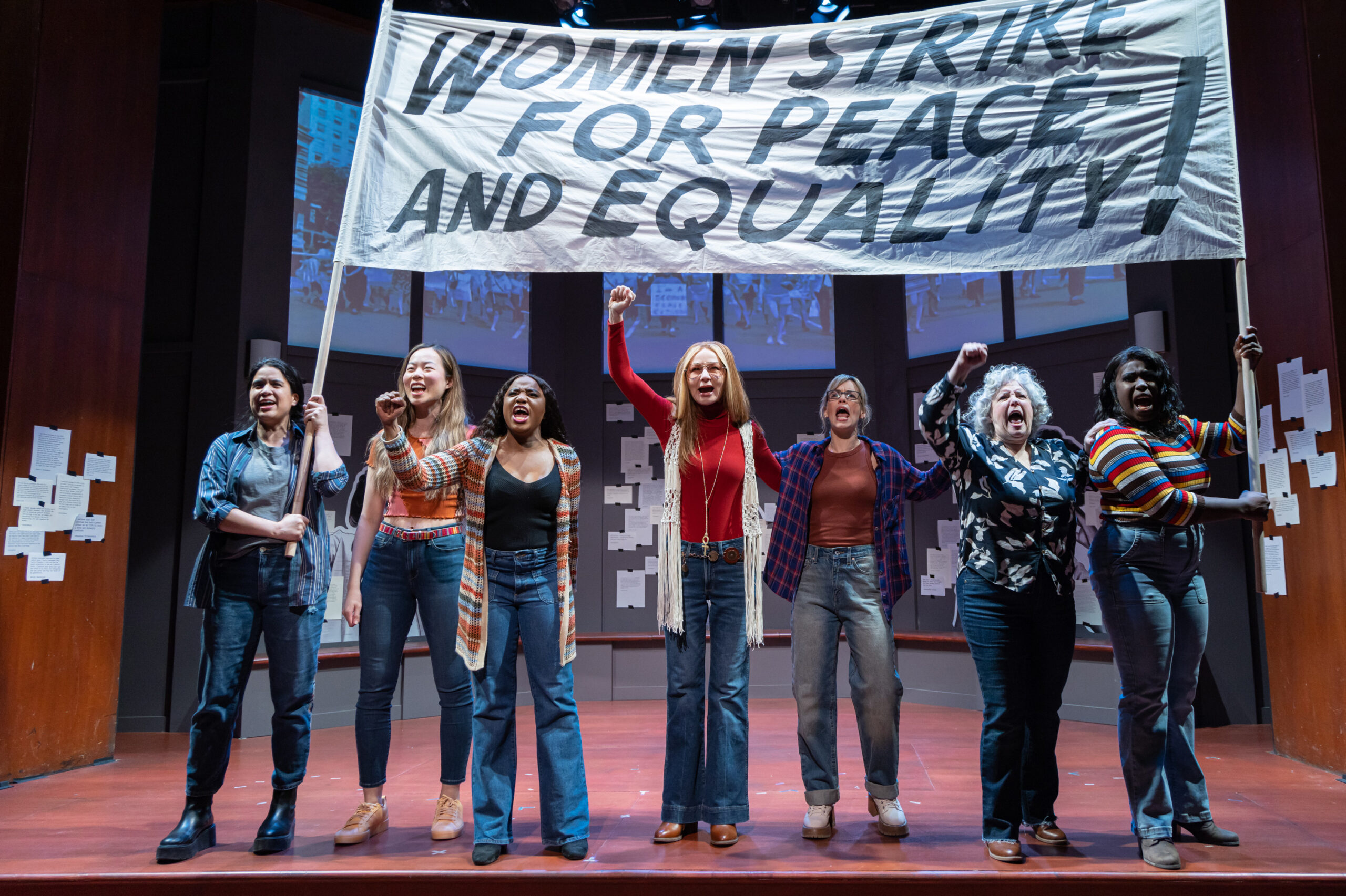Culture
 Susan Lynskey as Gloria Steinem in Theater J’s production of "Gloria: A Life." Photo by Ryan Maxwell Photography.
Susan Lynskey as Gloria Steinem in Theater J’s production of "Gloria: A Life." Photo by Ryan Maxwell Photography.
Continuing the Movement with Sherri L. Edelen of “Gloria: A Life”
March 22, 2023 @ 10:00am
Gloria Steinem’s life story and five decades of activism take center stage through April 2 at Theater J.
Letters upon letters layer the walls of Theater J’s main stage. Within the letters, women from different generations share their stories about the impact Gloria Steinem and second-wave feminism have had on their lives, what they wish for the next generation of women and advice on navigating current times. The messages and sentiment set the tone for Theater J’s current show “Gloria: A Life,” which depicts and celebrates Steinem’s life and her five decades of activism. By telling Steinem’s story, the show also highlights prominent BIPOC women of the movement, including Dorothy Pitman Hughes, Flo Kennedy and Wilma Mankiller.
Directed by Holly Twyford, the play runs through April 2 and creates multiple opportunities for audiences to engage and participate in discussions surrounding equality. In addition to the letters, the second act is dedicated to an open forum where audience members can ask questions, provide commentary on the show and share their personal experiences. Each night, at least one special guest involved in the movement is in attendance. Special guests have so far included Supreme Court Justice Sonia Sotomayor, Congresswoman Eleanor Holmes Norton, Congresswoman Connie Morella and Steinem herself (who flew in day of from an international women’s conference in Abu Dhabi).
We spoke with actor Sherri L. Edelen, who plays multiple roles in the all-women ensemble, about Steinem’s impact, audiences’ reaction and her biggest takeaways from the play.
District Fray: Gloria Steinem’s life has had a profound effect on so many, especially women, whether they are aware or not. Did you gain any new insight about Steinem since preparing for this show?
Sherri L. Edelen: It’s just been eye-opening, learning about all that she has done and what it’s meant to women. I didn’t always connect her name with equal rights for women and pro-choice movements. I know I am not alone in that. In our second-act talk back people often say, “I always kind of knew who she was, but I didn’t really ever know what she did and what it really meant.”
As part of the ensemble, you play a variety of characters throughout the show, with some switches happening seconds apart. Do you have a favorite?
I love playing Bella Abzug because she has taught me to speak up and use the voice inside of me. She embodies the voice in women that makes us feel like we are able to stand up for what we believe in.
I didn’t know much about Bella Abzug beforehand. Did you know much about her before the show?
I had heard of her and I knew that she was a heavy hitter for women’s rights and a congresswoman, but I didn’t know that much about her. I didn’t know she was a lawyer until we did the show. I actually learned that at the opening night party, because Supreme Court Justice Sotomayor came up to me and said, “I knew Bella. She worked really, really hard and a lot of people didn’t really like her.” I also met two men that worked for her who also said, “We were scared of her but we also really liked her.”
Oh, that’s interesting. What is your takeaway from those conversations?
When women have such voice and gravitas it often intimidates people. If she were a man, people might have said, “Wow. What a go-getter. He’s really in charge of things.” But when it’s a woman it’s “She’s bossy. She’s a real b—h.” It’s just the whole hierarchy we are unspokenly raised in.

“Gloria: A Life.” Photo by Ryan Maxwell Photography.
With the open forum talk back, have any of the shared stories stuck with you?
They all talk about their run-ins with the rights of women. One woman said she couldn’t get on an airline at one point in her life in the 1950s because it was an all-male airline. I’d never heard of that. That doesn’t exist anymore. Another lady stood up and said, “At my college in 1969, they wouldn’t let women wear pants so I organized 75% of the female student body and we sat outside the administrative offices on our campuses until they decided that we could wear pants.”
How about the letters?
People are being incredibly honest. One woman wrote about how she had two abortions and how it was a really hard thing for her to do but she was glad she had them and never thought there would be a time when this was not a right for all women in America. I would say 75% of the letters are on the topic of abortion and abortion rights.
What do you think is the main takeaway from the play?
This is the first show I’ve done where it’s not about the actors or the performances. It’s really about the subject matter. You see the women just shoot up out of their chairs at the end. They’re standing up for what we’ve been talking about for an hour and a half. We’ve had some men stand up at the talk back and say, “I didn’t know this. I see it now, and I’m gonna try to be a better man.” It just makes you cry. When people stand at the end of the show to applaud, I turn to Susan [Lynskey], who plays Gloria and I say, “You know this isn’t for us. This is for the content of this play. This is for the movement.”
“Gloria: A Life” runs at Theater J through April 2. Tickets start at $54.99.
Theater J: 1529 16th St. NW, DC; theaterj.org // @theaterjdc
Want first access to select shows and performances around the city? Join the District Fray community to access free and discounted tickets. Become a member and support local journalism today.







